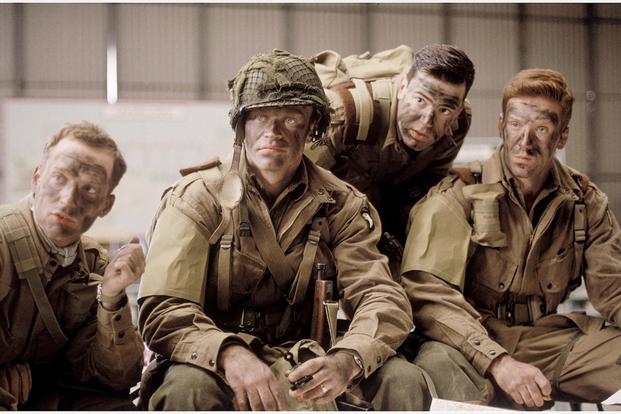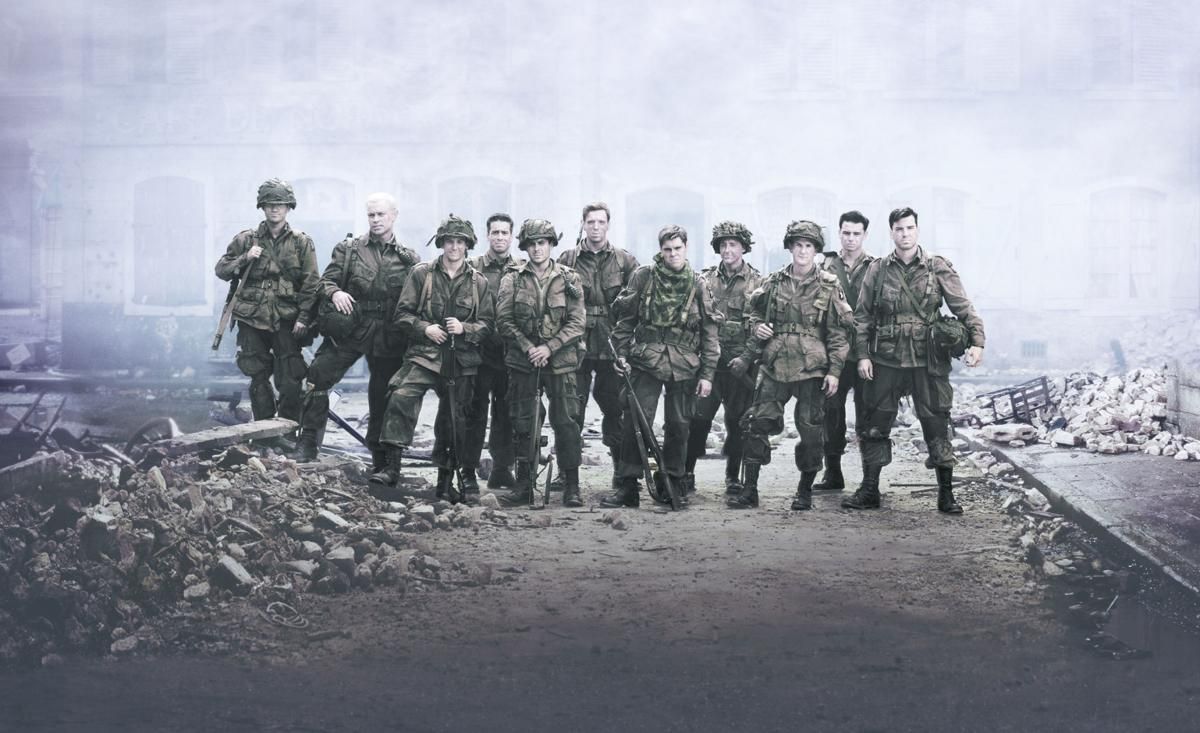In the final episode of the lauded HBO miniseries, Band of Brothers, Sergeant Lipton quotes King Henry V’s most famous speech, stating:
“Henry the Fifth was talking to his men and he said from this day to the ending of the world we and it shall be remembered. We lucky few, we band of brothers, for he who sheds his blood with me today shall be my brother.”
Lipton’s quote was poignant, but it was also a callback to a quote from a German general, who referenced the same speech when talking to his troops at their surrender to U.S. forces earlier in the same episode. This speech, of course, is itself a work of fiction–having been written by Shakespeare in his play, Henry V.
It may be turtles all the way down, but in a strange way, it’s fitting that the quote-within-a-quote perfectly balances history with fiction. After all, it’s what made Band of Brothers into a multi-award winning show that continues to be ranked among the best series in television.
Band of Brothers tells the story of the men of Easy Company, a part of the 101st Airborne Division, who fought in most of the major Second World War battles in Europe from D-Day to V-E Day. Viewers follow a recurring cast as they bond in training, drop behind enemy lines, and encounter the unspeakable horrors of the Holocaust.
The show won multiple Emmy and Golden Globe awards, amassed tens of millions of views during its initial September 2001 run, and retains a 97% approval rating on Rotten Tomatoes. Lauded by critics and audiences alike, it received praise for, as Caryn James of The New York Times said, the series “masters its greatest challenge: it balances the ideal of heroism with the violence and terror of battle, reflecting what is both civilized and savage about war.”
Now, twenty years later, it’s easy to see the massive impact Band of Brothers had on not just television, but the relationship between history and popular culture in general.
Band‘s influence on television is a bit easier to measure. Fresh off of the multi-Academy Award winning success of 1998’s Saving Private Ryan, Director Steven Spielberg and actor Tom Hanks sought another World War II project that could tell an even more visceral, real, and massive story. Along with writer, Erik Jendresen, they landed on an adaptation of Stephen E. Ambrose’s non-fiction book, Band of Brothers.
But if Saving Private Ryan changed what a film could show and say about war with its horrifying depictions of the Normandy landings and sacrifice, Band of Brothers changed what a TV show could be, period.

With a budget of $125 million (nearly $200 million in 2021), Band of Brothers easily became the most expensive miniseries in history to that point. Shot over nearly a year in various U.K. and German locations, production included one of the largest painted backdrops ever created to help turn an airplane hanger into massive set pieces like Bastogne.
That’s right. While Easy Company appears pinned down in a freezing, snow-filled forest during the Battle of the Bulge, the actors were actually filming inside a hot, non-climate controlled hanger in the middle of summer!
Television on this scale was simply unprecedented at the time. While earlier shows like The Sopranos redefined what premium TV could be, Band took it to an unparalleled scale. It truly changed the game in terms of resources, funding, ensemble, and production. An argument can certainly be made that Band of Brothers paved the way for shows like Rome, Boardwalk Empire, Game of Thrones, and even Chernobyl.
A harder to quantify, but arguably more important impact, is Band‘s influence on the relationship between history and mainstream culture.
Much like Saving Private Ryan, Band of Brothers helped usher in a decade that put WWII at the forefront of culture. Construction on the WWII Memorial in D.C. began in 2001 and ended in 2004. Call of Duty, one of the best-selling and longest-lasting video game franchises, first released in 2003 and was set in WWII. HBO would even follow up Band of Brothers with its own “sequel”, The Pacific, in 2010.
There’s no doubt that the series’ popularity also led to more people turning to history books and majors. Seeing the kinds of stories history can tell in such a premier format pushed many to take a new interest in studying the past.
While the Second World War has long been a popular source for media, Band seemed to represent a zenith of influence the war could have on mass media. It also remained one of the final major projects that could incorporate actual veterans, as more and more of the “Greatest Generation” were rapidly passing away.
In the end, incorporating the veterans is what makes Band of Brothers so unparalleled and incredible.
Each episode begins with snippets from interviews with unnamed veterans. Viewers can safely assume that these men were some of the paratroopers from the war, perhaps even 101st Airborne members. It’s not until the final episode that their names appear and we realize that these are some of the exact same men we’ve been following all along.
The actual Carwood Lipton, Bill Guarnere, Edward “Babe” Heffron, Richard Winters, and others all provide commentary. But what’s more important is that they help viewers understand that, while the show took some creative liberties, the emotions, sacrifices, trauma, and bonds built were all real.
Many of the actors even got to meet their real life Easy Company counterparts.
Robin Laing, who played Private Edward “Babe” Heffron, recently spoke in a History Hit interview about how surreal it was to meet the real Heffron during production. The two spoke on the phone a few times before meeting on set, where Laing asked Heffron questions about how he would have stood, reacted, or moved in certain circumstances.
According to Laing, the real veterans understood well that the show couldn’t be 100% accurate, but they nevertheless provided good guidance without controlling.
Some of the best moments interacting with the veterans occurred off set entirely. Laing and writer John Orloff also commented on the camaraderie between the remaining men of Easy Company, with numerous reunions and gatherings occurring in the decades leading up to production. Joining some of the veterans at the pub after filming, Orloff commented on how the real Bill Guarnere and Edward Heffron seemed the life of the party and able to drink anyone under the table.
What all of this produced is a show literally unique in its place in history. The actors, like the vets, have spoken about how they all remain in touch and the firm friendships forged through their own boot camp. These experiences contributed to an onscreen story unrivaled in its portrayal of the best and worst in humanity.
Band of Brothers stands among the best miniseries, even after two decades. For whatever inaccuracies armchair historians may want to pick at, no one can say it fails to do the story of Easy Company justice. More importantly, it does the story of so many soldiers of the Second World War justice. Putting their pain, bravery, courage, and sacrifice at heart of the show, Band of Brothers will long remain one of the greatest portrayals of war in media.

Leave a Reply